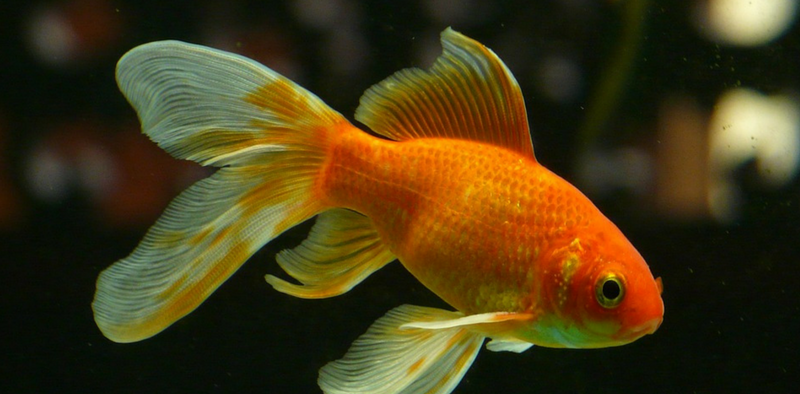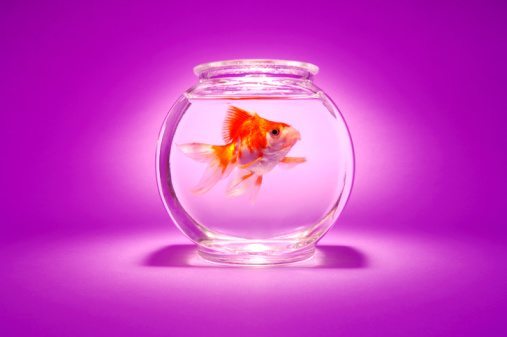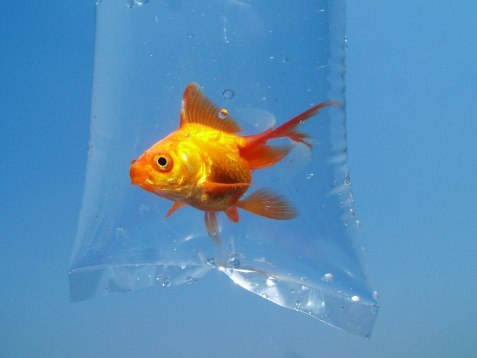Getting Your First Goldfish: Things You Should Know
Share

So, you want to become a goldfish keeper? Good for you! Goldfish are beautiful animals and can provide lasting enjoyment for many years. But, before you head out to choose a fantail or comet, or even a beautiful Oranda, there are a few things you should know about goldfish.
The first step in keeping fish is learning which type of goldfish is best for you and your lifestyle.
Types of Goldfish
Most pet stores sell three main types of goldfish: the Fantail, the Black Moor Telescope and the Common goldfish (also known as a Comet). Fantails and Telescopes are classified as “Fancy Goldfish,” which have double tails and shorter bodies; whereas the Common and the Comet are long and narrow with only one tail.
Though the hardiest of the varieties, Common or Comet goldfish (which are very similar, the difference being the longer tail of the Comet) are the least recommended for the beginner. This is due to the large size these fish achieve. Each of these are typically sold when they are only a few inches in length, but don’t be fooled; these fish have the potential to grow over a foot long!
Aquarium or Pond for Your New Goldfish
Common goldfish require a large volume of water to prevent stunting. Damage from stunting is permanent and will shorten the lifespan of your new pet. The general rule of thumb when selecting a tank size for fish is:
Plan on one gallon of water per 1 inch of adult fish size.
For example, if you have six fish, each of which are about 1 inch in length, you would need at least a 6-gallon tank. You will quickly need to upgrade to a 20-gallon tank assuming those fish grow to 3-inches in length.
When planning for a common goldfish, you will need eventually need 40 gallons per fish. This is where a pond set up comes in handy.. If you do add a pond to your backyard, learn to keep your dog out of the pond!
If you can’t afford to provide this much room for your goldfish, choose a fancy goldfish or tetra fish instead. You never want to have a pet that you do not have the means to provide for.
Fantails vs Moors
Fantails and Moors both have the same tank size requirements of at least 10-20 gallons per fish. This is typically much more feasible for the average owner. They do not grow as large, but will still reach a decent length of 6-8 inches when full grown. This is one of the reasons why glass bowls are not proper homes for goldfish of any type. As you can see, goldfish can rapidly outgrow a bowl and providing proper aeration and filtration is nearly impossible.

Black Moors are relatively hardy but tend to be trickier to keep because of their delicate eye protrusions. The Fantail is the hardier of the two, (in fact the hardiest of all fancy goldfish). They are able to live equally well in aquariums or ponds, as well as being the most readily available.
Checking for Disease
Examine the fish for any signs of illness beforehand. Unfortunately, illness is rampant in most pet stores. When purchasing fish, it’s much better to buy from a private breeder. You will want to make sure you start off with the healthiest fish you can. Steer clear of fish with the following issues:
- White spots on the fish are a sign of a parasite called ich.
- Slimy patches indicate sickness and possible parasite infestation
- Clamped fins, which mean the fish is not feeling well
Keep in mind that this step does not guarantee you will not bring home a sickly fish. Chain and independent pet stores alike must have their fish shipped to them from overseas. This usually means they have passed through several intermediaries – a process that causes significant stress. They are then crowded into display tanks with many other stressed fish. In their weakened state they are susceptible to picking up pathogens.
Selecting the Right Supplies for Your Fish
Once you have determined which kind of goldfish is best for you, you will need to assemble the proper equipment.
Goldfish produce a large volume of waste and need correct filtration in order to keep their water clean. The filter should be rated for the size of tank you will have. An oversize filter can help with cleaner water, but it may blow the fish around more. You will need to make sure the current does not disturb your pet or blow them around in the tank. An airstone isn’t necessary if you have a filter, but the bubbles can help oxygenate the water
Another thing you will need to get is water conditioner. I find Prime by Seachem to be superior, as it removes ammonia which is sometimes found in the tap water. Water conditioner takes out the harmful chemicals the water companies put in that will harm your fish.
Taking Your New Fish Home

Its important for you to make sure the transition from the store to your home is as smooth as possible. Ask the pet store worker if they can give you a larger bag and net the fish out gently. The less chasing around, the better.
If possible, have someone in the car with you hold the bag steady to avoid as many bumps as possible. It is also a good idea to place the plastic fish bag in a paper bag. T his helps block out the light and keep the fish calm.
You will need to discuss the best “fish calmant” with the pet store. We have used Stress Coat for years with great success. These liquid supplements help reduce fish stress. It works by replacing the natural secretion of slime that is interrupted. They can also help heal damaged tissue, torn fins, and skin wounds. These are commonly caused by handling, shipping, fish fighting, and other forms of stress.
So there you have it! Now the work has just begun – taking care of a goldfish is no easy task. But getting off to the right start is an important step when it comes to keeping this beautiful creature.










